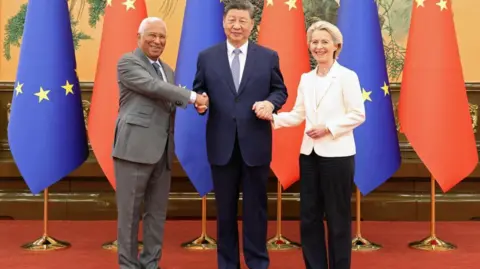European Commission President Ursula von der Leyen has proclaimed that the relationship between the European Union (EU) and China finds itself at a pivotal moment, or an “inflection point,” as acknowledged during a crucial one-day summit in Beijing. The discussions between von der Leyen and Chinese President Xi Jinping were framed by challenges that stemmed from an increasingly imbalanced trade dynamic, where the EU grapples with a significant trade deficit in its dealings with China.
Von der Leyen pointedly addressed the issue of trade imbalances during their meeting, highlighting that as cooperation between the two powers deepens, it also accentuates the economic disparities, with the EU’s trade deficit with China reported at €305.8 billion ($360 billion) in the previous year—indicative of a doubling of this figure over the last nine years. She also underscored that China’s relations with Russia have increasingly influenced its ties with the EU, asserting that this connection is now a “determining factor” in how Europe interacts with China. President Xi responded by calling on European leaders to responsibly address their differences, maintaining that the challenges Europe faces are not fundamentally rooted in its dealings with China.
The backdrop to this summit included heightened expectations that evolving American political dynamics may facilitate improved EU-China relations. However, as the Trump administration executed policies seen as adverse to both parties, relations have grown markedly tenser. This reality was coupled with EU member states facing pressures analogous to those in China, particularly pertaining to tariffs imposed on their exports to the U.S.
The summit’s agenda and its truncated duration, reduced to a single day at Beijing’s behest, prompted skepticism about the outcome’s significance. Still, von der Leyen and European Council President António Costa urged effective dialogue to identify “real solutions” to current impasses. They collectively emphasized the need for both China and Europe to acknowledge mutual concerns for future collaboration, with Xi expressing a desire for “mutual trust” and collaboration to navigate these turbulent waters.
Despite some articulated hopes for advancing cooperation, the atmosphere at the summit seemed to reflect underlying tensions. Von der Leyen’s motivation was to highlight that both parties could cultivate a partnership that could define their future, while Chinese officials framed the gathering as a chance for renewed collaboration. Nevertheless, significant friction emerged from various geopolitical rifts, notably concerning the ongoing war in Ukraine. The EU’s recent decision to impose sanctions on two Chinese banks due to their involvement in aiding Russia has not only irritated Beijing but also contributed to the already clouded atmosphere preceding this summit.
Trade relations, a primary concern for the EU, faced continued challenges. The imposition of tariffs on Chinese electric vehicles last year were met with retaliatory duties on European liquor, demonstrating an ongoing cycle of restrictions and responses. In light of these tensions, China’s announcement of export controls on rare earths and critical minerals has raised alarms in Europe, leading to accusations from von der Leyen that China utilizes its quasi-monopoly in these vital areas to undercut competitors across key industries.
In response to the evolving status of EU-China relations, the Chinese envoy to the EU, Cai Run, criticized the EU’s approach to China as confusing, likening it to a traffic light simultaneously displaying green, amber, and red signals. This metaphor effectively conveys the disarray stemming from the EU’s mixed messages, oscillating between cooperative and confrontational stances regarding its relationship with China.
Overall, the results of the summit appear ambivalent, finding both leaders acknowledging areas of concern while grappling with the challenges posed by economic disparities and geopolitical complexities. The future trajectory of EU-China relations hinges upon their ability to bridge these gaps and navigate an increasingly intricate global landscape.












